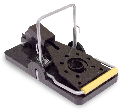When a pet owner thinks of parasites in relation to their pet, most typically think of external parasites such as fleas and ticks, since they can actually see them on their pet. Yet, the parasites that are the most destructive to your pet's health are the ones that you cannot see—internal parasites. Some internal parasites include hookworm, whipworm, tapeworm, roundworm, and heartworm.
What can you do to protect your household pets from parasites? Here are some guidelines to follow:
If you decide to treat your pet with over-the-counter wormers, make sure that you follow the direction label on the product, and make certain that you tell your vet of the medicines you have administered to your pet. Overmedicating your pet—or worming too often, with several different products—can prove fatal.

The End of the Road for Mice! Quickly eliminate pesky mice and small rodents with this handy six-pack of traps. Easy to bait, set, use, and release. Unique design catches rodents from the front, sides, and back. Simple, safe, sanitary, and reusable for years. Check out Snap-E Mouse Traps today!
Everyone knows that parasites are no good, and that it is frankly a rather experience to have them. But do you know what ...
Discover MoreLice are highly contagious. If your child is exposed to lice, there are chemical and natural remedies to get rid of them.
Discover MoreHave you noticed how it seems like you can't turn on the news, open a magazine, or listen to the radio without hearing ...
Discover MoreThere are currently no comments for this tip. (Be the first to leave your comment—just use the simple form above!)
Copyright © 2025 Sharon Parq Associates, Inc.
Comments